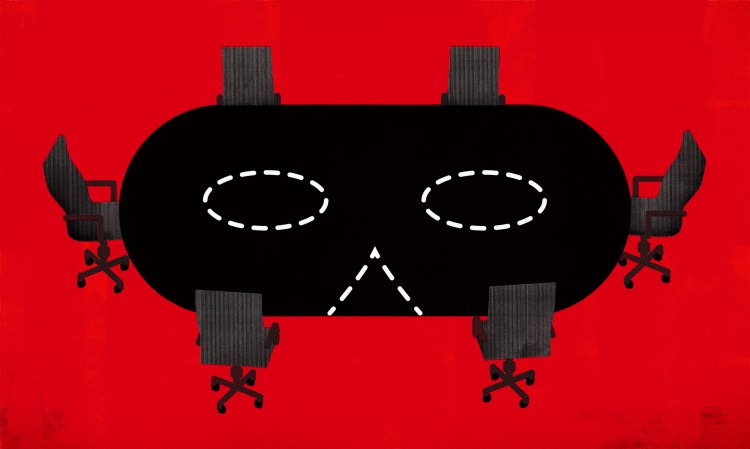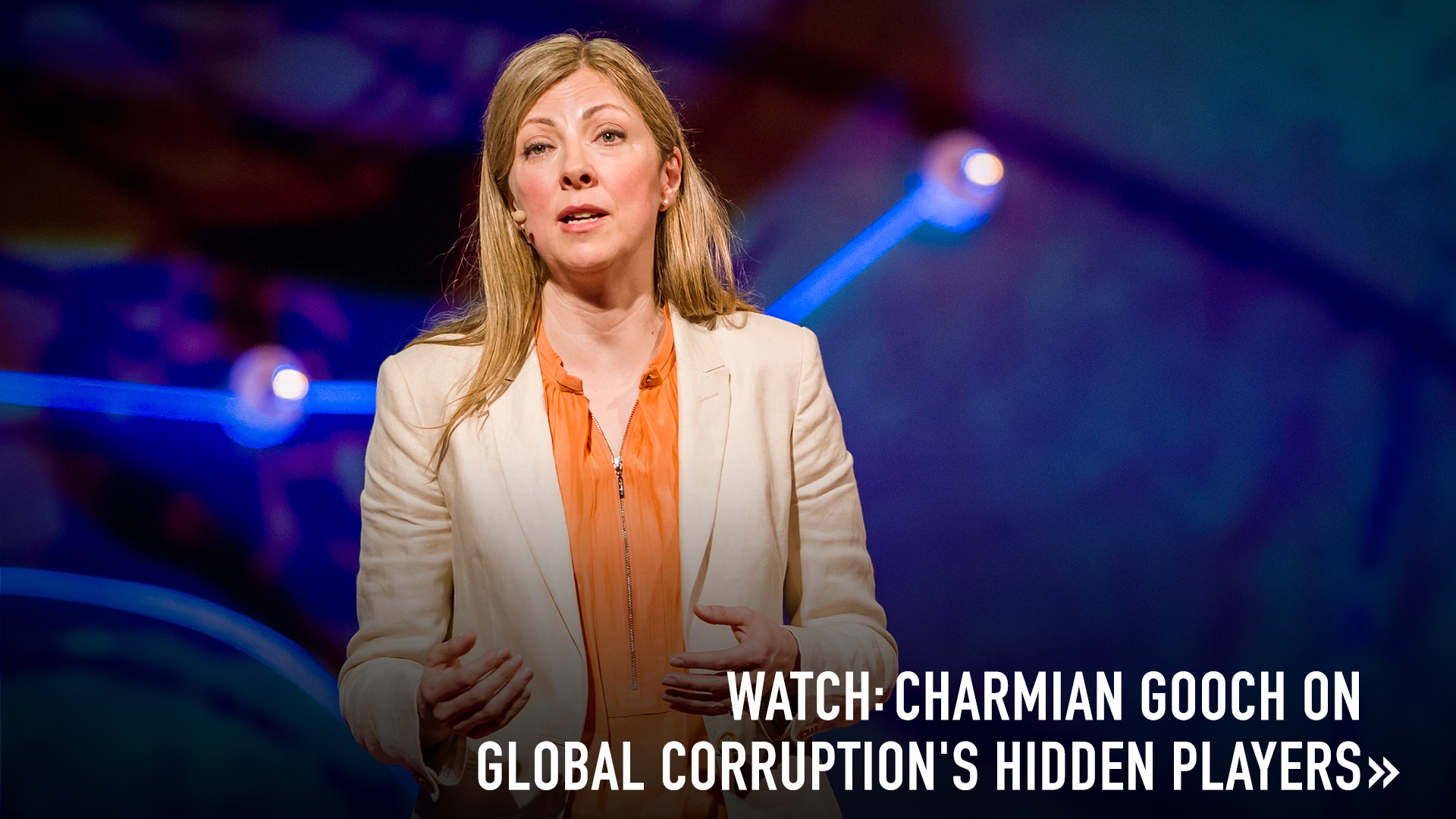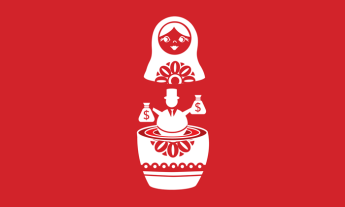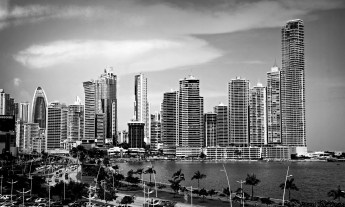
Corrupt officials and criminal operators are brilliant at hiding their money and actions from public view. But there’s something we can do about it, says the team at Global Witness. It starts with closing loopholes.
When we think of bribes and fortunes siphoned from public funds, we tend to picture henchmen in trench coats trading suitcases full of money. That, however, is rarely how things go.
“More often, it’s done by exploiting the global financial network. The way it works is through a bank or a wire transfer,” says Mark Hays of Global Witness, the anti-corruption organization co-founded by TED Prize winner Charmian Gooch and featured on 60 Minutes. “If you’re a corrupt government official, a shady business executive or a criminal operator, you generally need three things. First, a bank that’s willing to do business with you. Second, an attorney, accountant or other facilitator to broker your scheme. And third, a getaway car. Anonymous companies provide the perfect vehicle to move money without being detected.”
Tighter regulation in these three areas could make a big dent in global corruption. Below, a look at eight specific loopholes that Global Witness wants to see closed, tightened or, at the very least, examined closely. These things are, as of now, perfectly legal. Global Witness asks: should they be?
How to close the loopholes for anonymous companies
End the ability to own or control a company anonymously. What do Medicare fraudsters in the United States, drug cartels in Mexico and resource plunderers in the Democratic Republic of the Congo have in common? Global Witness has investigated how each uses anonymous companies to launder money and evade accountability. When she won the TED Prize in March 2014, Charmian Gooch called on governments to create public registries of business ownership that would be “open and free, accessible across borders for citizens and businesses and law enforcement alike.” Her wish echoed with the zeitgeist. In April 2014, the United Kingdom moved forward on creating a public register of who owns and controls companies. “They are in the process of implementing the law now, and all signs point to a pretty robust rule,” says Hays. In December 2014, the European Union updated its anti-money laundering rules, requiring that all European countries create similar registries. (States can choose whether to make them public, or whether to give information upon request.) Still, the tightening of these laws will only help so much. Global Witness hopes all nations — including the US, which is the easiest place to set up an anonymous company after Kenya — will follow suit. “The financial network is global, so the response needs to be global,” says Hays.
Require more transparency for privately held companies. According to The Economist, the number of conventionally structured companies in the US has dropped 46% since 1997. Today, two-thirds of companies are formed using privately held “pass-through” structures, which aren’t subject to the same disclosure rules as traditional companies with shareholders. Take, for example, the LLC, introduced in 1975 so people wouldn’t have to risk everything to start a new venture. “Anonymity was a by-product of a time when most people knew who they were doing business with,” says Hays. Given the complexity of today’s global financial system, Global Witness wants LLCs and other private companies to be no longer exempt from ownership disclosure. Most of these companies are above board, of course, but private formation structures too easily lend themselves to abuse. “For decades, investors who own certain percentages of publicly traded companies have been required to disclose their ownership, to guard against fraud and market manipulation. That sets a strong precedent,” says Hays. “That obligation should be extended to all company owners.”
Scrutinize real estate purchases made by anonymous companies. In the series Towers of Secrecy, The New York Times revealed how wealthy buyers ducking behind anonymous companies have become a major force in luxury real estate, from the condos of New York City to the mansions of Bel Air. According to the paper, shell companies purchase nearly half of all US homes valued at more than $5 million. “For individuals who might be looking to stash suspect funds, properties are a lucrative and safe investment,” says Hays, “especially if you can hide the purchase.” So Global Witness was glad when, in January 2016, the US Treasury Department announced that it will scrutinize big, all-cash real estate purchases made by anonymous companies in New York and Miami, from March to August of 2016. Specifically, they’ll require that insurance companies involved in these transactions verify the owners of companies and report that information. It’s a big step, but Global Witness hopes the government expands the program nationally — and makes it permanent. “The scope is still pretty narrow,” says Hays.
How to close the loopholes for banks
Hold bankers responsible when rules are broken. International anti-money-laundering guidelines are set by the Financial Action Task Force, and countries have their own laws too. In the US, for example, the Bank Secrecy Act requires that banks file reports on transactions greater than $10,000 and report suspicious activity. Still, banks don’t always uphold the rules. In the case study “Banks and Dirty Money,” Global Witness notes that in more than 200 cases of corruption committed between 1980 and 2010, at least $56.4 billion was looted from public funds — and 140 banks handled the proceeds. More than a third of the world’s 50 biggest banks were implicated. The problem, says Global Witness, is skewed incentives; banks stand to make a lot of money off these kinds of clients. One idea for shifting the balance: remove the legal blocks that keep senior bank executives from being held personally responsible for wrongdoing. Global Witness would like every bank to name a senior executive to lead anti-money laundering efforts along with compliance teams, and to take the heat when things go wrong. The EU is on its way to adopting this kind of rule. “Until the people who run banks start to lose bonuses, face personal fines, suspension, or in the most extreme cases be criminally charged, they will not take rules seriously,” the case study says.
Require all banks to do due diligence on customers. International guidelines require that banks “know your customer” — in other words, that they understand who ultimately owns their accounts. This is important, so banks can give extra scrutiny to accounts held by individuals or entities that pose a higher money-laundering risk. But because of a loophole, for accounts opened by legal entities, US banks don’t actually have to determine the owners’ identities. The US government noted this problem in June 2013, but change takes time, and Global Witness expects an amended rule this year. They hope it will require banks to ask for the beneficial ownership information — and then verify it. “We want to make it harder for banks to accept money without doing serious due diligence,” says Hays.
Increase penalties for banks that accept money from questionable sources. In the 1990s, the President of Equatorial Guinea, Teodoro Obiang, siphoned money from the country’s timber and oil industries and used anonymous shell companies to deposit over $700 million in a number of American banks. A large portion ended up at Riggs Bank, which as it turns out, also accepted millions from Chilean dictator Augusto Pinochet. Riggs paid a total of $41 million in fines, and collapsed as a result of the scandal. But this is a rarity. Too often, says Global Witness, fines are minor and banks think of them as a cost of doing business. Global Witness encourages financial penalties in line with wrongdoing, and recommends other types of deterrents too — say, for example, that a bank be banned from doing business with government officials for a certain period of time. “We need better incentives as well as stronger penalties,” says Hays.
How to close the loopholes for lawyers, real estate agents and other brokers
Tighten the requirements for lawyers to do basic due diligence against money laundering. On Sunday, 60 Minutes aired Global Witness’ latest investigation: an undercover investigator posed as an adviser to a West African government official and met with 13 prominent lawyers in New York City. The investigator used a hidden camera to film conversations in which 12 of these lawyers offered advice on how to hide suspect funds. Lawyers are, of course, subject to criminal code and can face disbarment. “But as a professional body, lawyers are largely self-regulated, and the code of conduct they’re required to abide by is mostly based on self-reporting,” says Hays. Global Witness wants to see lawyers required to do due diligence on potential clients, especially those who are government officials, and be required to report suspicious behavior to authorities. This is controversial. “The objection we hear is that this would undermine attorney-client privilege, a concept that’s often thought of as sacrosanct in the US,” says Hays. “But there is precedent. For example, tax lawyers and others who advise on risky tax transactions are obligated to report them to the tax authority or risk penalties.”
End due diligence exemptions in real estate deals. In the US, the people involved in closing real estate deals — real estate brokers, lawyers, escrow agents — are not required to take basic actions to prevent money laundering — such as verifying the identities of the people they work with. They’re cleared to do business with anonymous companies, and any background checks they perform are voluntary. In the original version of the Patriot Act, these facilitators actually were required to verify the identities of the companies and individuals buying property, and screen them for potential risk. But the real estate industry lobbied for a temporary exemption — and it has lasted more than a decade. Global Witness would like this exemption ended, stat. “If these individuals had to do due diligence on their customers, verify their identities and report it, that would help deter people from using real estate deals for money laundering,” says Hays. “Do we really want to be a luxury landing pad, no questions asked?”
And that to Hays and the rest of the team at Global Witness is the point: just because something conforms to current law doesn’t mean it’s ethical. Human beings are incredibly crafty when it comes to finding ways around the rules, and it takes concerted effort to cut that off at the pass.















